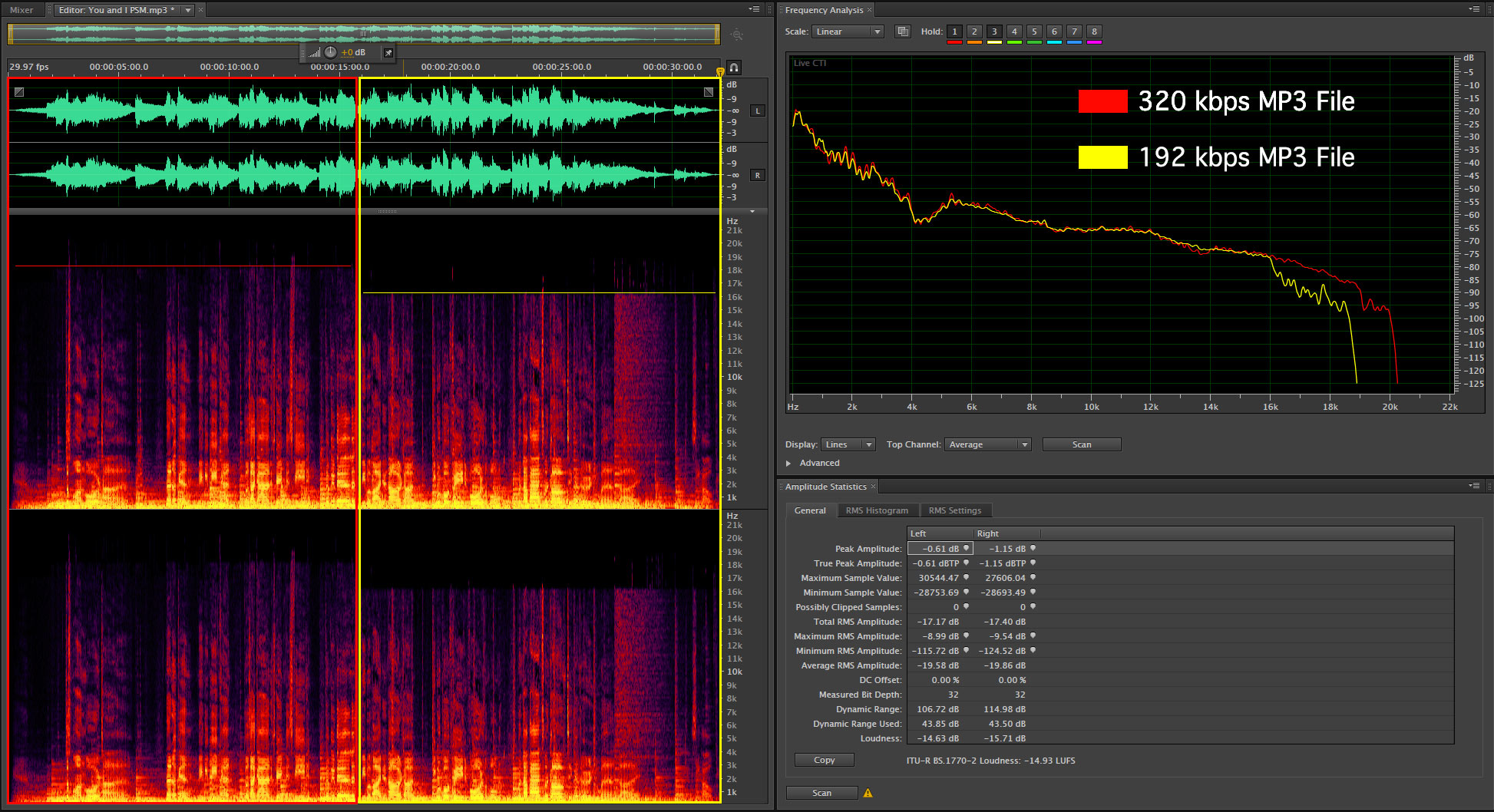HRA Solutions: Step 2
A very common complaint from purchasers of “high-resolution” music is that they don’t sound any different than the CDs or even vinyl LP versions. As a result they feel ripped off…not a good sign for high-resolution audio/music. I can’t tell you how many emails I’ve received from people feeling that they’ve been cheated. This is especially true of the albums that have been newly transferred from analog master tapes to high-resolution PCM bit buckets. Whether there is any perceptible difference is not really the problem when a potential customer is thinking about making a purchase. The real issue is whether they will be happy with the “high-res” sound when they hear it through their own system.
The various download sites offer 30-90 second samples of the music. These files are not the “high-res” tracks that you’ll receive after you’ve purchased the album. They are “lossy” MP3 files. I went to HDTracks and ProStudioMasters and auditioned the second tracks from James Taylor’s new records, “Before This World”. It was notable that HDTracks provided a 30 second sample from the middle of the song and ProStudioMasters played a 90 second sample starting at the beginning of the tune. I’m not an expert on copyright law, but something in the back of my memory tells me that 30″ is the limit for “fair use” in quoting music. I like the longer sample (and I offer much longer samples on iTrax) but I’m not sure it’s legal.
In addition to the files being different lengths, they were different in fidelity. The production people at HDTracks are preparing 320 kbps MP3 files while the ProStudioMasters engineers have opted for very low quality 192 kbps MP3s. I guess they figure that listeners wouldn’t really care about the quality of the samples. I certainly do. I analyzed both sample files. Here are the spectra:
Figure 1 – A spectrograph of an MP3 at 320 and 192 kbps. [Click to enlarge]
MP3 files at 320 kbps are very hard to distinguish from 44.1 kHz/16-bit CDs. So the quality of the sample files being played by HDTracks is as good as it gets. But the samples are not what you purchase. So how about HDTracks and the other “high-res” download sites give potential customers a preview of the “high-res” tracks instead of the “lossy” compressed streaming files that they currently provide?
It’s not trivial to stream 96 kHz/24-bits PCM files (and remember some of the files available at these sites are offered at 384 kHz/24-bits…which is completely ridiculous!) but it’s not difficult at all to make short segments of the final “hi-res” files available through other means. The sites could offer access to an FTP site or deliver files via Dropbox or other similar methods. Allowing potential customer to get 30 seconds of a the real file and listen to it in their own system would be a huge step forward for High-Resolution Audio.
No one could ever complain that they didn’t know how good (or bad) an individual albums or track sounded because they would have the ability to hear it prior to purchase. Think of it as a free sample of a new product at the grocery store…try before you buy.
The high-res download sites could do this tomorrow…but they probably won’t. The samples on my iTrax site are encoded as MP3 files at 320 kbps, which is really good (kudos to HDTracks) setting up a mechanism for real high-res samples would be better.
Coming tomorrow…
Step 3: All high-resolution audio files should cost the same as the standard-resolution versions.



The real issue is whether they will be happy with the “high-res” sound when they hear it through their own system.
I think that a good set of headphones plugged into a good sound card on your computer should be able to show some inherent difference in quality. That sure beats listening to a boombox or car player with road noise.
All they have to do is experience it at home at the actual final resolution and decide whether it’s worth their money.
Mark, I really, really do not think step 1 and step 3 are anything but ‘easy’ for record industry.
The fact is pretty much most of them can’t and won’t be able to do step 1, let alone rest of nine steps.
I can only hope that I can convince a few people operating sites or working on the committees to adopt some of the items I’m suggesting. I don’t hold my breath.
I believe ProStudioMasters is a Canadian company and Canadian copyright laws probably allow for longer sample lengths.
I doubt it…the length of the samples may be governed by governments but it is more likely an item in the contracts with the labels.
Sort of related but in the quest to get back the analogue sound apparently sanitised by digital recording, people have developed the VTM
http://www.slatedigital.com/products/vtm
Do you have any views on these in terms of HRA?
I’m very aware of the common production processes used to make hit records. They use lots of virtual instruments (samples) and have entered an era where they can use modelling to recreate the sound of analog tape machines, analog processors, and even classic analog consoles. They all have a “sound” that artists, engineers, and producers want…think of them as tools. I have no issue with the use of digital modelling or virtual instruments. It’s not what I do and I think it makes music a little homogenous but it’s OK for those who want or need that sound.
They are trying to achieve a sound…and that sound has nothing to do with high-resolution audio. We don’t really need all of the accuracy and extended dynamic range or frequency response when producing a recording in the “analog” style.
I guess if what they want is analogue sound, then record with analogue equipment and then archive the final mix (or even the studio masters) to digital. Seems a bit silly to me.
Mark,
I would guess that a site legitimately selling copies of a piece of music would be considered to be acting on behalf of the copyright owner – or at least under license – in offering the sample clips, not infringing the copyright. Since a clip can’t substitute for a copy but can only stimulate interest in getting a full copy, I don’t think playing a 90 second clip would get one of these sites in trouble.
It’s all about the natural of deal and any possible copyright laws. Apple has done just fine with 30 second samples…you just have to pick the right 30 seconds.
Mark:
I have, on many occasions, compared so-called HiRes downloads from the usual vendors with my 192kHz/24bit LP ‘needle-drops’ done carefully, with high quality equipment. The LP digital files, in many cases, sound better than the ‘official’ commercial downloads… in some cases, much, much better!
I believe this is probably due to the fact that a good clean LP pressing issued shortly after the original release date has more audio information than the commercial download made with a ‘master’ tape some 30 to 60 years later. Obviously tapes age and not all vault archive copies are in pristine condition.
Ophelia
It is certainly possible to get great results with vinyl LPs…but the standard operating procedure in making vinyl requires a master mix to be eq’d and prepared (compromising fidelity and other attributes) according to the limitations of vinyl. I would much prefer to have the best analog tape master transferred from the best analog deck to the best PCM ADC than a digital produced from a piece of vinyl. The LP won’t have “more audio information” than the tape unless the tape has suffered from overplaying or other damage.
The studios doing the remastering have to make these choices all the time…and sometimes they use vinyl LPs as the source…but not very often.
In my 50+ years of experience listening to recorded and live music I have learned that critical listening is a learned & developed skill. It is an ongoing process. Unfortunately most people (I have come in contact with) have no interest in spending the time or energy to learn or practice this skill. Perhaps education is part of the answer.
You’re absolutely right. Knowing how to listen and what to listen for is an essential…perhaps the most important…aspect to music enjoyment.
Hello Doc,
Would the album Abbey Road sound better if it was released in 24/96 compared to the current CD?
Is there sometimes music information lurking on the master analogue tape (and hence on the ProTools Beatles files) above the limit of Redbook CDs?